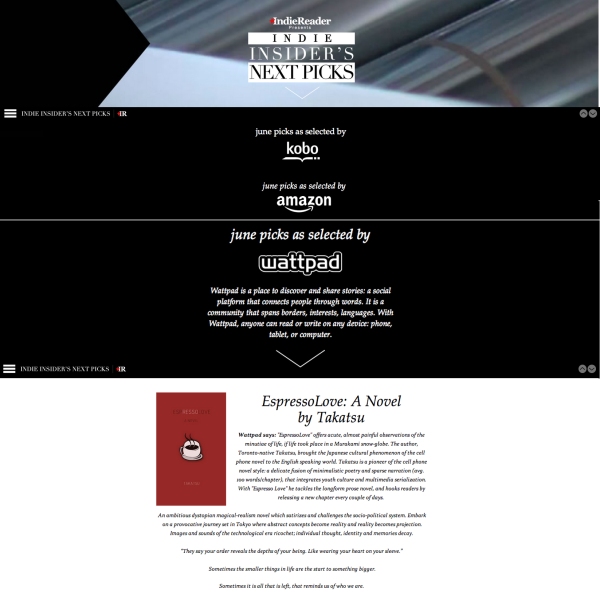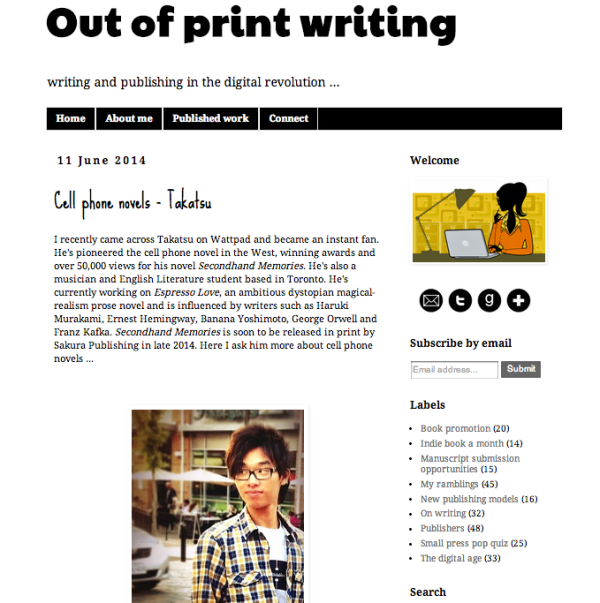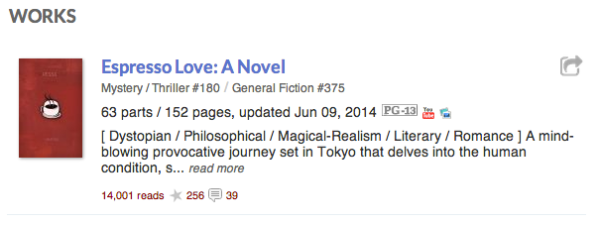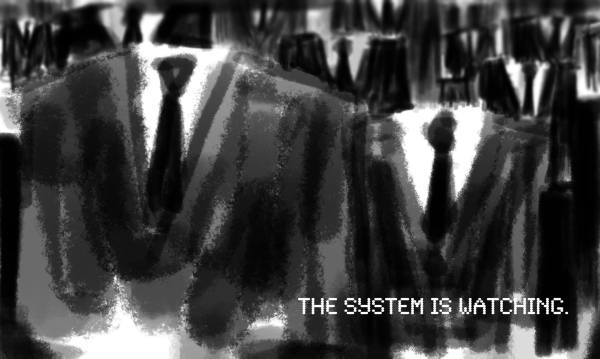Some really cool things happening! Firstly, today Espresso Love has been chosen by Wattpad as a feature on IndieReader.com right alongside Kobo and Amazon picks, so that kinda feels really neat. Secondly, Rowena Wiseman of Out of Print Writing blog has done an interview with me on Cell Phone Novels 🙂
Espresso Love’s manuscript document is past 150,000 words heading to 160k (only 120,000 posted up) and at 14,000 views on Wattpad. Nearly complete. Just a little more to go. It’s been a draining challenging journey but this is probably my biggest accomplishment to date. I’ve never written so much before nor have been able to see something from beginning to (near) end. I’ve poured a life’s worth of philosophies, ideologies, insight, and researched everything from trauma scene biohazardous disposal teams and coroners; 7/11 coffee machines in Tokyo; Baudelaire poems; Japanese formal business suit brands; rural town Chitose, Chiba; Natsume Soseki; climate, elevation, coffee growing and arabica beans in Colombia; Carl Jung and Freud; Paganini, Chopin, Mendelssohn, Lisa Ono, Nirvana, Dylan’s “Desolation Row” and more music I started to get into; Yokohama and Cosmo Clock 21 ferris wheel; post WWII treaties between US and Japan; this local newspaper of Chiba (Bonichi); suicide rates; massacre in Virginia Tech and Akihabara; Tokyo Metropolitan Library; tea bag brands; linguistics and nuance of Japanese words; rabbit and cat fur; death certificates and family registrations of Japan; how to make a torch in the wild without anything packed; George Berkeley’s philosophies; Intellectual property contracts; Jackson Pollock; Harry Truman; garbage trucks in Japan (sounds like ice cream trucks in america), holidays in Japan, and a lot more…. The journey is just beginning however. After this first draft, I will have to rewrite, refine, organize, edit, cut it down to hopefully approximately 100,000 words – don’t know how many drafts i need – and get it off to editors, agents, and move it towards publication. There are some exciting doors that seem to be gathering and opening in the future, so I’m really stoked. Then there’s also multimedia projects that I’ll be working with people on. And all this…. has been so overwhelming, and now that I think the writing process is over, I’m starting to feel the end blues, tired and satisfied, and sad that it will be over soon and intimidated by the long journey ahead. I need a long break/vacation after writing the first draft. I’ll revisit it in full in a month or two’s time. If anyone wants to be my editor, feel free to let me know. This phase in the journey is almost over and the next is about to begin.
On the other hand, I pulled my tablet and finally give Shizuka a sketch beside Naoki Maeda. Here is a cute anime paint job of the couple…
And an abstract impressionist quick five minute exercise!
I will also be beginning my multimedia collaboration project campaign with something rather simple this summer. I, along with friends, will be doing an installation art / social experiment by putting up lots of interesting, thought-provoking, satirizing, challenging, potentially creepy, minimalistic design “posters” of certain quotes/messages all over the city, film and take pics of the process, all locations, and also secretly film reactions, if there are reactions or maybe do interviews. (put together a documentary at the end if it turns out well) But I can’t do it alone! We need interested people and street teams! More details and planning to follow, contact me if you’re in Toronto and interested!
Tune for the time being
[youtube=https://www.youtube.com/watch?v=zcogD-hHEYs]
I feel a somewhat absurd connection with Haruki Murakami, where I write out of the subconscious but it seems to naturally instinctively copy elements of his works. Essentially, Murakami has always been my biggest influence and role model for writing, philosophy, and so on, but I actually don’t try to consciously copy his style. My natural style IS extremely similar to his intrinsically, and as such, the more I study his work, it’s like studying and discovering my own self. Recently, with Espresso Love, I realize many elements, symbols, scenes, themes, etc are basically regurgitations of his novels, even the ones I had never read before. Sometimes as I go through more of his work, I realize I basically wrote the same thing already. LOL It’s kind of scary at times. Anyway here are some passages from Sputnik Sweetheart that practically describe me and my life as a writer, (other than the fact that it’s a female character)
—
“At the time, Sumire—“Violet” in Japanese—was struggling to become a writer. No matter how many choices life might bring her way, it was novelist or nothing. Her resolve was a regular Rock of Gibraltar. Nothing could come between her and her faith in literature.
After she graduated from a public high school in Kanagawa Prefecture, she entered the liberal arts department of a cosy little private college in Tokyo. She found the college totally out of touch, a lukewarm, dispirited place, and she loathed it—and found her fellow students (which would include me, I’m afraid) hopelessly dull, second-rate specimens. Unsurprisingly, then, just before her junior year, she simply upped and left. Staying there any longer, she concluded, was a waste of time. I think it was the right move, but if I can be allowed a mediocre generalization, don’t pointless things have a place, too, in this far-from-perfect world? Remove everything pointless from an imperfect life and it’d lose even its imperfection.
Sumire was a hopeless romantic, a bit set in her ways—innocent of the ways of the world, to put a nice spin on it. Start her talking and she’d go on nonstop, but if she was with someone she didn’t get along with—most people in the world, in other words—she barely opened her mouth. She smoked too much, and you could count on her to lose her ticket every time she took the train. She’d get so engrossed in her thoughts at times she’d forget to eat, and she was as thin as one of those war orphans in an old Italian film—like a stick with eyes.
…
The first time Sumire met Miu, she talked about Jack Kerouac’s novels. Sumire was absolutely nuts about Kerouac. She always had her Literary Idol of the Month, and at that point it happened to be the out-of-fashion Kerouac. She carried a dog-cared copy of On the Road or Lonesome Traveler stuck in her coat pocket, thumbing through them every chance she got. Whenever she came across lines she liked, she’d mark them in pencil and commit them to memory as if they were Holy Writ. Her favourite lines were from the fire lookout section of Lonesome Traveler. Kerouac spent three lonely months in a cabin on top of a high mountain, working as a fire lookout.
Sumire especially liked this part:
No man should go through life without once experiencing healthy, even bored solitude in the wilderness, finding himself depending solely on himself and thereby learning his true and hidden strength.
“Don’t you just love it?” she said. “Every day you stand on top of a mountain, make a 360° sweep, checking to see if there are any fires. And that’s it. You’re done for the day. The rest of the time you can read, write, whatever you want. At night scruffy bears hang around your cabin. That’s the life! Compared to that, studying literature in college is like biting down on the bitter end of a cucumber.”
“Okay,” I said, “but someday you’ll have to come down off that mountain.” As usual, my practical, humdrum opinions didn’t faze her.
Sumire wanted to be like a character in a Kerouac novel—wild, cool, dissolute. She’d stand around, hands shoved deep in her coat pockets, her hair an uncombed mess, staring vacantly at the sky through her black plastic-framed Dizzy Gillespie glasses, which she wore despite her 20/20 vision. She was invariably decked out in an oversized herringbone coat from a second-hand shop and a pair of rough work boots. If she’d been able to grow a beard, I’m sure she would have.
Sumire wasn’t exactly a beauty. Her cheeks were sunken, her mouth a little too wide. Her nose was on the small side and upturned. She had an expressive face and a great sense of humour, though she hardly ever laughed out loud. She was short, and even in a good mood she talked like she was half a step away from picking a fight. I never knew her to use lipstick or eyebrow pencil, and I have my doubts that she even knew bras came in different sizes. Still, Sumire had something special about her, something that drew people to her. Defining that special something isn’t easy, but when you gazed into her eyes, you could always find it, reflected deep down inside.”
—
“Sumire was too focused on becoming a novelist to really fall for anybody. If she did experience sex – or something close to it – I’m sure it would have been less out of sexual desire or love than literary curiosity.”
—
“Her stepmother’s love for her never wavered during her long, difficult years of adolescence, and when Sumire declared she was going to quit college and write novels, her stepmother—though she had her own opinions on the matter—respected Sumire’s desire. She’d always been pleased that Sumire loved to read so much, and she encouraged her literary pursuits.
Her stepmother eventually won over her father, and they decided that, until Sumire turned 28, they would provide her with a small stipend. If she wasn’t able to make a living by writing then, she’d be on her own. If her stepmother hadn’t spoken up in her defence, Sumire might very well have been thrown out—penniless, without the necessary social skills—into the wilderness of a somewhat humourless reality. The Earth, after all, doesn’t creak and groan its way around the sun just so human beings can have a good time and a bit of a laugh.”
—
“She was living in a one-room apartment in Kichijoji where she made do with the minimum amount of furniture and the maximum number of books. She’d get up at noon, and take a walk around Inogashira Park in the afternoon, with all the enthusiasm of a pilgrim making her way through sacred hills. On sunny days she’d sit on a park bench, chewing on bread, puffing one cigarette after another, reading. On rainy or cold days she’d go into an old-fashioned coffee house where classical music played at full volume, sink down into a worn-out sofa, and read her books, a serious look on her face as she listened to Schubert’s symphonies, Bach’s cantatas. In the evening she’d have one beer and buy some ready-to-eat food at the supermarket for dinner.
By 11 p.m. she’d settle down at her desk. There’d always be a thermos of hot coffee, a coffee mug (one I gave her on her birthday, with a picture of Snafkin on it), a pack of Marlboro and a glass ashtray. Of course she had a word processor as well. Each key with its very own letter.
A deep silence ensued. Her mind was as clear as the winter night sky, the Big Dipper and North Star in place, twinkling brightly. She had so many things she had to write, so many stories to tell. If she could only find the right outlet, heated thoughts and ideas would gush out like lava, congealing into a steady stream of inventive works the likes of which the world had never seen. People’s eyes would pop wide open at the sudden debut of this Promising Young Writer with a Rare Talent. A photo of her, smiling coolly, would appear in the arts section of the newspaper, and editors would beat a path to her door.
But it never happened that way. Sumire wrote some works that had a beginning. And some that had an end. But never one that had both a beginning and an end.
*
Not that she suffered from writer’s block—far from it. She wrote endlessly, everything that came into her head. The problem was that she wrote too much. You’d think that all she’d have to do was cut out the extra parts and she’d be fine, but things weren’t that easy. She could never decide on the big picture—what was necessary and what wasn’t. The following day when she re-read what she’d printed out, every line looked absolutely essential. Or else she’d Tippex out the whole thing. Sometimes, in despair, she’d rip up her entire manuscript and consign it to the bin. If this had been a winter night and the room had had a fireplace, there would have been a certain warmth to it—imagine a scene from La Bohème—but Sumire’s apartment not only lacked a fireplace, it didn’t even have a phone. Not to mention a decent mirror.
*
On weekends, Sumire would come over to my apartment, drafts of her novels spilling out of her arms—the lucky manuscripts that had escaped the massacre. Still, they made quite a pile. Sumire would show her manuscripts to only one person in the whole world. Me.”
—
“The novels—or fragments of novels, really—Sumire wrote weren’t as terrible as she thought. True, at times her style resembled a patchwork quilt sewn by a group of stubborn old ladies, each with her own tastes and complaints, working in grim silence. Add to this her sometimes manic-depressive personality, and things occasionally got out of control. As if this weren’t enough, Sumire was dead set on creating a massive nineteenth-century-style Total Novel, a kind of portmanteau packed with every possible phenomenon in order to capture the soul and human destiny.”





